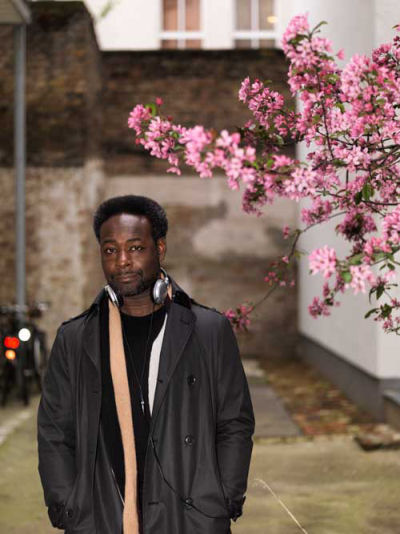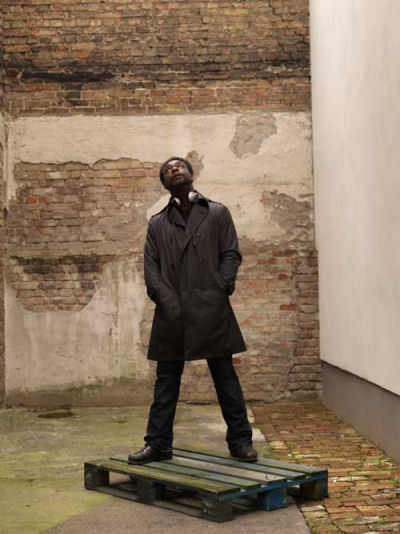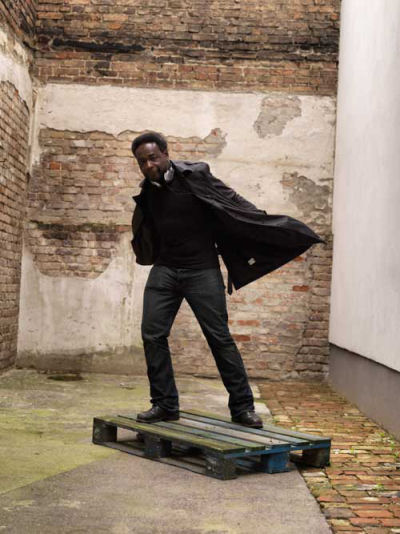| A Guy Called Gerald im Interview | |
 |
DE:BUG 28th July 2010 Weblink |
 Die britische Acid-House und Jungle-Legende über Manchester, technologischen Fortschritt und sein neues Album Gerald Simpson aka A Guy Called Gerald doesn't need much of an introduction. He's been an integral part of dance music since the acid house explosion in the late 80s. As one of the founding members of 808 State and as an solo artist he catapulted acid house into the global charts before leaving pop stardom behind him and embracing the rough and futuristic sounds of hardcore and jungle in the early 90s, which led to a few groundbreaking 12″s and one of the best jungle albums ever recorded, "Black Secret Technology". Never one to get too comfortable within one sound and scene, Gerald moved to New York in the late 90s and recorded two more downbeat albums for K7. A few years ago he relocated to Berlin, where he returned to his roots in techno and house and recorded for labels like Sender, Perlon and Beatstreet. "Tronic Jazz: The Berlin Sessions", his newest album came out two months ago on Laboratory Instincts. We visited Gerald in his expansive Loft in Prenzlauer Berg and talked about his formative years in Manchester, technology and his new-found freedom as an artist. Debug: Do you visit your hometown Manchester frequently? Gerald Simpson: No, I usually go once or twice a year, maximum. When I left I said to myself that I wasn't ever going back. But I have been back, playing gigs and stuff. I like the place, it's my home, but I don't feel complete there. I guess I've got do a few more things and then one day I can go back there. It changed though. I don't know if for the better or for the worse. There is a lot of stuff happening there and a lot more people getting involved in new projects and music and stuff like that. There are a lot of kids who seem to be very excited. That's always a good energy. But there is also a lot of nervousness about getting stuff done, waiting for the results and not getting on with the actual action. Debug: These days there are business plans involved, career plans. Gerald Simpson: Yeah. in the 80s it was a little more adventurous. More underground is maybe a better description. We did it for the enjoyment of the moment. We wasn't trying to follow a plan. Not like ‘Okay, first I get this record done and then ..'. It was more like ‘wow, I am releasing a record'. The excitement of actually getting it to vinyl was the achievement. That was the goal, the success. Getting it that far. To get there you really had to work. You knew, once it was pressed on vinyl it was frozen, it was always gonna be that way. Today everything is so easy, sometimes it seems to me that the actual process of making music isn't even an important part of it anymore. Just throwing a few loops together, you know. All the elements are already there. There is a path pre-laid already. You only have to find the right promotion and the right name to then push whatever it is through. There are some tracks that are really cool, though, but you have to search for them. But I feel there aren't many tunes that come to a certain conclusion. What are these tracks about? What were you thinking, while you did them? I don't say that there should be a concept. But there should be something about the music, some kind of story. Even if it's abstract.  Debug: There is this documentary about the emergence of acid house in the UK called "We Call it Acid". One thing it shows, is the impact that this new movement had on british culture. You are also interviewed in it. Seeing it you really remember, that there was a time, when you had to fight to party, where it wasn't normal that you would have all these different people together on the dancefloor. Do you sometimes think that the kids today are taking the dance culture for granted? For all they know it has always been there. It's an industry now, it shaped the face of western culture. Gerald Simpson: It was interesting. In the really early days it was very segregated. There wasn't so many black people mixing with white people. The Hacienda was one of the first clubs where people really mixed. It was a melting pot. The music was mixed as well. And then you stood there and watched people dancing and there were all these football and hooligan types. Even though they weren't really involved with that, they had a strange energy about them. Manchester has two football-teams and every saturday something would happen there. So the football thing was very present in the city. With acid house and pills these football lads slowly started to cross over. After the match they would go out and party. The attitude changed. It was mad to see, how the scene changed within a few years. You had these football guys, and these pop guys and all these dance crews, and within four years, from the mid 80s to the late 80s it became rave. By the 90s the political side became involved and started to hunt people down. I didn't understand it, I always thought somebody should get a nobel peace prize. (laughs). Suddenly people who were doing these raves became criminals. I couldn't believe it. The whole hooligan thing wasn't an issue anymore. Everybody just went to these parties. And the promoter's telephones started to get tapped, and they got really high sentences. It was crazy. I guess, apart from the drugs and the noise, one of the things that troubled the government was that it got too big. They couldn't control it. And then they started to pass all these strange laws. When all these football hooligans were roaming the streets putting cars over beating people up, there weren't any new laws filed to change that. But when that stopped and everybody started to go to these raves, it was suddenly supposed to be really dangerous. (laughs). Debug: Pretty much from the get-go house was a pop thing in the UK. Why do you think that is, this instant chart success? Gerald Simpson: There was always a party culture in the UK. And radio played an important part. Pirate radio. A lot of people would tune into the pirates and listen to all these imports and then buy them somewhere. And before you knew it, you could find the record at HMV because it got so popular. If it wasn't for the pirates, we wouldn't have this culture today. People were really interested in alternative music as well. New music. America for instance was always different. Back in the day I did parties in Los Angeles and it was like I was showing them rave. I played records from Detroit and Chicago and New York, but they didn't get it that all this music was from down the street. For them it was this foreign thing. It was weird. I realized that the UK was a melting pot. There was always a strong american influence. And if you went to an import records shop you would get it all. east coast, west coast, Chicago, Detroit. The culture that build around the parties and the pirates was completely outside any commercial system. Hunting down new records at the radio stations, swapping dubplates and all. I knew how unique this new community was, this new system. I had already been to America and had seen how things were done there, and I thought what was going on in Britain was just amazing. At the time I was signed to Sony and I tried to tell them that I had this new way of promoting my music. I told them that if I would give my upcoming records to a few key djs in the scene half their job would be done. But they didn't understand it and told me that according to my contract I was not allowed to give away masters of my music because they own them, blah blah blah. I was like ‘okay fair enough, but you are going to complain, when the records won't sell. Trying to sell my music in your system doesn't make sense, because your system is too slow and too big. If you let me use my system within your system I can make things work'. There was so much potential, they even had their own cutting plants. I could have cut my own plates for christ sake. Bu they didn't get it. They thought I was about to do something that was illegal. In the end I started my own label Juice Box.  Debug: You signed to Sony after "Voodoo Ray" hit the charts. Gerald Simpson: At the time I had problems with 808 State. I got involved with my management because they had legal people who were able to help me out with the whole 808 State case. They told me that to finance that I had to sign to a major label. Tony Wilson, the head of Factory Records, was about to start his own dance label back then, where I initially wanted to sign, because it would have been more independent. But in the end I went with Sony, where I had my own imprint "Subscape" within their system. But I still had no control over how they would promote my music. In them days it was still really oldschool. Basically, they said: ‘you do the music and we do the promotion, and you do not tell us what to do.' They signed me on the basis of "Voodoo Ray", but I think they were really confused how I could have entered the chart system around their system. My management at the time said to me that they are a global organization and that I would have that machine behind me. In any country. It's a funny system. They are basically only looking at numbers. They wanted to make me the next big thing, comparing me to Michael jackson, and I was like, my music will never be successful in that realm. It's not about the next big thing, but about all these next little things. They didn't see it. I was really young back then but I knew there was a lot of bullshit in the system. To have to deal with that was a sacrifice for me to get a studio and to able to go on a tour. Debug: The other day I listened to "Black Secret Technology", your seminal jungle album. You kinda left the scene right before it peaked between 95 and 98. Why was that? Gerald Simpson: Jungle started out as an artform. I really understood what a sampler was for. Creating the music. But it got really stale. People using the same loops. And slowly but surely all these rules were established. I always just did my own thing, so I knew I wasn't going to fit in. I'd rather slip underneath the radar. By 1997 or 1998 I decided to move to New York, where I experimented with other types of music, different vibes. K7 liked it and so I got involved with them. By 2000 I really had it with musical genres. I just wanted to make electronic music. The progress of technology changed so much. Everything became so easy and accessible. So why should I hold myself back? It seems to me, that the more freedom there is, the more rules pop up. The other day I thought about making an instructional video on how to cope with the situation if the dj switches musical genres in his set. (laughs) ‘Emergency! Genre change! You can now change your dancing style or run for the bar!' Debug: It's weird, because the technology can make it so easy these days to move from one genre to the next. Gerald Simpson: The tools are there and they become more and more advanced. The stuff you can do with Ableton is just unbelievable, it's mental. But people still behave like caveman. It's like having an amazing palette of colours and then, on top of that, someone creates all these new types of brushes, that you can paint with, and then you just get a pencil and stick it into the painting, because it's easier like this. We didn't get wrapped up so much in issues like different tempos. There was another way of looking at dance music back then. People felt cool, while they were dancing. That's what I am trying to do at the moment, make music that makes people look cool when they dance to it. (laughs) For me personally there needs to be a new genre – for tech-heads. People who appreciate the technical ability of programming of certain people like you can hear pianists who take something like Beethoven to another level. I think there needs to be some people that can actually hear the ability that goes into making music so that it becomes a challenge and an artform Debug: Your new album is the second "Berlin Session". On the first one you went back to your acid roots and the new one, "Tronic Jazz" is very influenced by the classic techno sound from Detroit. Is that your way of reminiscing about your roots and an attempt to update these sounds? Gerald Simpson: More and more I feel like I am becoming my own little microcosm. I mean I am conscious of the fact that I am here (in Berlin) for a long time now. Back in the early 90s I wanted to some stuff like the "Tronic Jazz" album. But at the time I was with Sony and they wanted me to produce vocal tracks. I think Black Box were number 1 back then and they wanted something similar. I kinda escaped and did some things in Detroit under different names, which was a really good experience because there was no pressure. It has opened me up to having freedom. With my new album and also the one before I realized that I have the freedom to just create a little concept, record a session and build an album from the material. Debug: So you feel more free artistically? Gerald Simpson: Yeah, I do. There is a lot more freedom. It's a lot easier. I try to only enjoy it now. I dreamt that it would come to a point where everyone would create their own style of music, and we are kind of there in a way. The only thing that bothers me, is that I have this breakbeat problem I have to solve. (laughs) I wanna do a next level breaky type thing but make it in a way that people still look cool when they are dancing to it. (laughs) [Author: Sven von Thülen] |
|